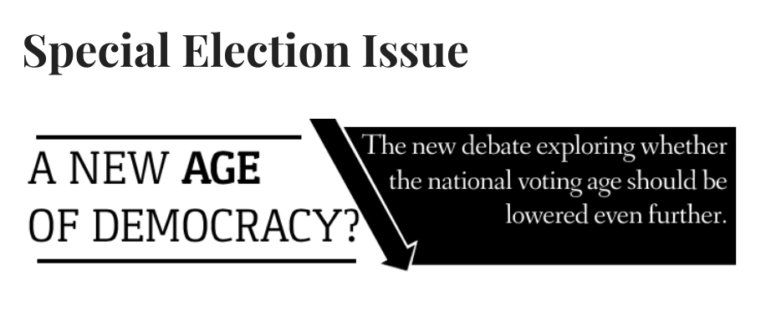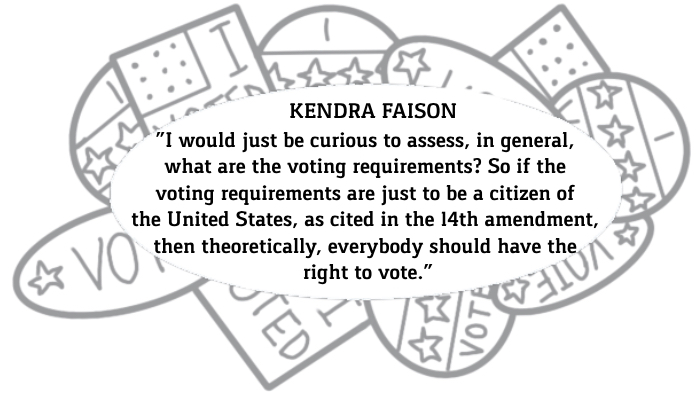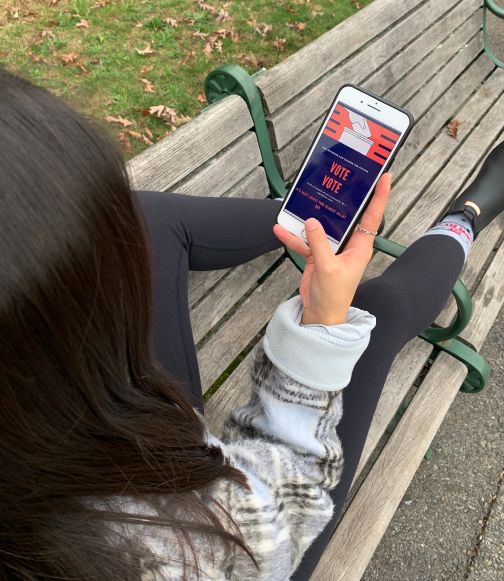The dedicated staff of Columbia High School’s award-winning student newspaper, The Columbian, proudly present their third online edition at chsthecolumbian.com. The following article “A New Age of Democracy?” by Vincent Zakian, In-Depth Co-Editor of the Columbian and member of the Class of 2021, was originally published by The Columbian on Oct. 31, 2020. With permission from CHS administration and staff at the newspaper, Village Green will be posting more content from the current issue of The Columbian in the coming weeks.

Designed By: Jared Garelick
On March 23, 1971, the United States House of Representatives voted 401-19 in favor of the 26th amendment to the Bill of Rights, which was set to change the legal voting age from 21 to 18. This was the byproduct of a movement that began in World War II, which pushed for the voting age to be lowered on the basis that a young man sent into battle overseas should be able vote in his home country. In 2020, with a presidential election looming, there is a new movement in America to lower the voting age once again, this time to 16.
With discussion about lowering the voting age intensifying, it is necessary to consider the potential impact of lowering the voting age down to 16. “I think there would be [an impact] since younger people tend to be more concerned about the future in a way that many adults are not…” said Stephen Fradkin, a sociology teacher at Columbia High School (CHS), “But again, and forgive me for being so blunt and opinionated, but only if America was a fully functioning democracy, which it is not.”
However, there are many perspectives to consider. When the 26th amendment was ratified in 1971, it was because voting was a right of citizens, and Americans believed that it was a right they deserved to have if they were fighting for their country. Now, there are new causes for why the voting age should be lowered. “As a teacher of juniors who are largely 16, I don’t know to what extent they would have the maturity to [vote], but at the same time, I’m not taking that [right] away from them,” said Kendra Faison, a history teacher at CHS. She continued, “I would just be curious to assess, in general, what are the voting requirements? So if the voting requirements are just to be a citizen of the United States, as cited in the 14th amendment, then theoretically, everybody should have the right to vote.”

While there are other causes, Faison points out that there is a chance that 16-year-olds, and even lower, already are able voters.
Young people experience the effects of elections, both through their parents’ livelihoods and through ideological divides. According to the Voting Rights Act of 1965, “Any person who has not been adjudged an incompetent and who has completed the sixth grade in a public school in, or a private school accredited by, any State or territory, the District of Columbia, or the Commonwealth of Puerto Rico where instruction is carried [out] predominantly in the English language, possesses sufficient literacy, comprehension, and intelligence to vote in any election.” According to this criteria, there is little difference in the thought process and decision making of a 16-year-old and an 18-year-old. Fradkin commented, “I see huge differences in intellectual maturity between all the grade levels in high school. I’m not saying that there are not [younger] people capable of mature political decision making, nor am I saying that people who have reached the age of 18 are all so capable. In fact, our actual voting habits, as well as the choices before us and the level of public discourse in this country, brings this into question. I wonder if, in a society with a high level of education and public discourse, and with a more robust political culture that was not dominated by only two parties that are both run by monied interests, young people having a say would be better for all.”

Overall interest among the potential new demographic is a factor in the argument as well. Sebastian Kalogerou, ‘22, said, “I believe that there are many informed 16 year olds that would have enough understanding in politics to debate them and vote, but the majority do not have much understanding or care for it.”
America is no stranger to amending previous legislation. And now, nearly 50 years after the ratification of the 26th amendment, there are new voices, demands and causes that are all creating a debate over whether or not the voting age should be lowered from 18 to 16.
The two movements for lowering the voting age have very different causes, but both were born out of necessity. Right now, America may not be in a place for this kind of change, however, maybe it should have happened years ago. The question is, is the situation as dire as it was in the late 1960s and early 1970s? There is so much to consider.

